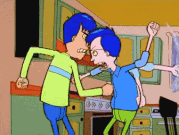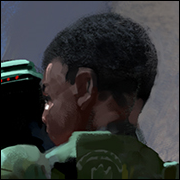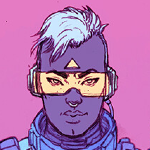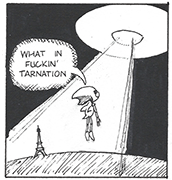|
Ruud Hoenkloewen posted:What kind of things do you keep in mind for line edits? I'm chewing through a project by feel at the moment. Once I'm done I'm planning another pass for specific things: I also like to look at scene weight, and if there's a good reason, I like to try and see if there's a way I can get more poetic/flowery about something to add gravity. There's no specific quantifiable thing I'll look for here, it's all vibes. For instance, recently I changed up the ending of a chapter where a character was spiraling to turn the last paragraph into one run-on sentence, because it made the way the chapter ended feel more dramatic and intentional. This is kinda why I don't like writing explicit lists of what I focus on--some of the time, the line edits I need to do involve breaking rules that I followed out of habit. e: Oh, and imagery/turns of phrase! When I'm doing line edits, I'll often look at what kind of imagery I'm returning to in the scene (or want to use) (or turns of phrase I want to use less) and see if there's ways of saying the things I drafted that also touches on the imagery/vibe. Like, again a recent example, the main character in this book has an eating disorder, and I realized it'd be stronger to shift her nagging feeling or lump in her throat into feelings in her guts, into hollow exhaustion, into a lack of control. Or another semi-recent one was when it was pointed out to me that the main character had tears prick at her eyes every other fuckin' page, and that that had become my default emotional reflection to frustration. Changing these up doesn't change the meaning of what's said, but it makes the method of what's said feel more cohesive. Wungus fucked around with this message at 14:33 on Jun 22, 2023 |
|
|
|

|
| # ? May 21, 2024 00:47 |
|
General Battuta posted:Some people have alleged this stupid rear end post was helpful for their line edits. https://www.sethdickinson.com/2015/02/26/lets-hurt-sentences/ I have this bookmarked in my editing resources for that exact reason
|
|
|
|
Ruud Hoenkloewen posted:What kind of things do you keep in mind for line edits? I'm chewing through a project by feel at the moment. Once I'm done I'm planning another pass for specific things: I’m gonna be kinda specific to first person here, because I think its considerations can be adapted to third, but keep in mind my advice is primarily for the former. When writing first person, I wish more people focused on one thing beyond all else: does this sound like my character? Is this something they’d say when telling a story? Cause I see a lotta amateur first person poo poo where they stage their characters as if they’re writing in a shallow third, when they could instead be selling me on the character’s opinions and trying to make their perspective interesting. When you focus on that (again, usually in first person), it short-circuits most worries about whether you’re focusing on body parts or using passive voice, because instead you’re asking, “Why does my narrator give a poo poo about the doorknob?” or “Oh he’s using passive voice and weasel words here because he’s trying to shift blame.” A repetitive phrase in extremely voicey prose can become a kinda running joke if that suits your tone. Or certain filler words can be a verbal tic—one used to indicate your character’s state of mind. I’m all for naturalistic dialogue if it’s done with a light touch. Like if the character uses “just” a lot—just make sure it’s intentional, and anything goes. As Wingus said, it’s all vibes. That said, I went through lists like this when I was learning how to write a novel, and it’s still good practice until you got this and start writing intuitively.
|
|
|
|
Stuporstar posted:I’m gonna be kinda specific to first person here, because I think its considerations can be adapted to third, but keep in mind my advice is primarily for the former. I'm also doing first person, so what you say resonates  I very much agree that character voice wins out. I let myself break any 'rule' if the sentence/scene would just be worse off for it. My problem, as you suggest, is that intuitively I don't write at all like my character. They're blunt and obsessive, yet in a first draft I have them speak like ChatGPT, or make them talk about what I *want* the scene to have over what it probably *should* have. Partly this feels down to me learning a lot more about my character as I write. Wungus posted:e: Oh, and imagery/turns of phrase! When I'm doing line edits, I'll often look at what kind of imagery I'm returning to in the scene (or want to use) (or turns of phrase I want to use less) and see if there's ways of saying the things I drafted that also touches on the imagery/vibe. Like, again a recent example, the main character in this book has an eating disorder, and I realized it'd be stronger to shift her nagging feeling or lump in her throat into feelings in her guts, into hollow exhaustion, into a lack of control. Or another semi-recent one was when it was pointed out to me that the main character had tears prick at her eyes every other fuckin' page, and that that had become my default emotional reflection to frustration. Changing these up doesn't change the meaning of what's said, but it makes the method of what's said feel more cohesive. This is a great point. I feel generally OK in crafting imagery that's coherent and not-awful, but don't often think about how they should themselves be colored by the speaker, rather than direct transplants out of my writer brain.
|
|
|
|
Ruud Hoenkloewen posted:I'm also doing first person, so what you say resonates One thing I do that helps is I give my characters distinct literal voices, like their own tone and timbre, and if I can hear that voice in my head while reading it means I nailed it, whereas if I’m hearing my own internal voice when reading then I have to rephrase the sentence until it sounds like them talking instead.
|
|
|
Stuporstar posted:One thing I do that helps is I give my characters distinct literal voices, like their own tone and timbre, and if I can hear that voice in my head while reading it means I nailed it, whereas if I’m hearing my own internal voice when reading then I have to rephrase the sentence until it sounds like them talking instead. In his book on writing, JMS had a fun cheat for this. If you are having trouble with a voice or keeping it consistent, he says to just imagine a favourite actor playing the role/character.
|
|
|
|
|
Ruud Hoenkloewen posted:What kind of things do you keep in mind for line edits? I'm chewing through a project by feel at the moment. Once I'm done I'm planning another pass for specific things: I find myself doing a lot of "stage directions". I'm curious about what's considered bad about them. And is there something that you would generally advice one to do instead? Just leaving it out or...?
|
|
|
|
stage direction is fine if it does something for the story. blocking is good. just dont have meaningless movement or placement imo. you can usually kill two birds with one stone with these kinds of sentences. do something character driven in relation to an object/place in the scene. character reminiscing through a window at an object outside: good and fine. they are distant from a thing. it tells you a relationship between character and object or place. character looking through a window: this is not enough information. are they daydreaming? are they avoiding eye contact? i think this is more what this is in reference to. character storms across the room to grab a knife: ah, they are becoming violent. excellent. stakes are raised. character walks across the room: not enough info, again. all this does is modify the pacing of a conversation usually. do something better. anime was right fucked around with this message at 22:22 on Jun 23, 2023 |
|
|
|
Milkfred E. Moore posted:In his book on writing, JMS had a fun cheat for this. If you are having trouble with a voice or keeping it consistent, he says to just imagine a favourite actor playing the role/character. This is what I always do. Casting the story is so fun. And nobody can stop you putting Jeffrey Combs in everything.
|
|
|
|
HopperUK posted:This is what I always do. Casting the story is so fun. And nobody can stop you putting Jeffrey Combs in everything. Why would you ever cast anyone else?
|
|
|
|
Okua posted:I find myself doing a lot of "stage directions". I'm curious about what's considered bad about them. And is there something that you would generally advice one to do instead? Just leaving it out or...? If they’re not important, it’s better to leave them out. They get tedious fast when they’re pointless. Pointless stage directions are even more egregious in first person, because as I read that poo poo I’m thinking, “Why are you telling me exactly how you’re sitting in a chair? Who cares!” When you’re judicious about employing body language, it makes every action notable rather than spraying a fog of unnecessary detail for the reader’s eyes to glaze over
|
|
|
|
Writing stage directions often comes from trying to describe a scene exactly as you're imagining it. In film, those details add versimilitude, making it seem more naturalistic than a video of two people on stage reading lines to one another. In writing, it those stage directions become extra noise that crowds out the important* detail. The goal is that all of your words serve some purpose. *Important to the work. Sometimes 'setting a tone' or 'sounding repetitive' is important, even if the actual details of what you're saying are mundane.
|
|
|
|
A good rule is have everything you write convey character. If you are describing a character moving then how do they move? Think of succession, if you watched that, and think about how the way each character moved through and interacted with the world was unique to that character.
|
|
|
|
Good points! Thank you. Something to add to the pile of things to look out for in the second draft.
|
|
|
|
My only real thought with stage directions is that if I ask the question "why is the POV noticing this" they tend to come out more gooder. Maybe in a first person POV, the character isn't paying a lot of attention to the way their conversational partner is getting increasingly irate; maybe in a distant third person, the POV is trying to pull attention to the way everyone in the room is avoiding a stinky dude; maybe in a second person, the POV is focusing on how the protagonist is being deliberate about cleaning their room. There's no real wrong way to approach writing them, so long as you're writing them deliberately, and not just because words probably go there.
|
|
|
|
Hi folks, I'm looking to swap critiques. I've got a short script (less than 2K words) I'd like some feedback on, anyone want to trade work?
|
|
|
|
posting this here because its most relevant i think: https://gizmodo.com/google-says-itll-scrape-everything-you-post-online-for-1850601486 this should be markedly obvious, but AI companies are scraping all public info. google, however, updated its TOS to say anything it can access can be used to train AI models. so potentially hosting your work on gdocs for crits is potentially exposing your work for something like Bard to steal *before its even published.* if something like an AI text farm mill is using something like bard to generate a work, you are in potential danger of plagiarizing yourself because google (and other companies, but google owns stuff that youd potentially use) is using things you may not think are public as training data.
|
|
|
|
AI can write stories now? What a time to be alive. But the stories couldn't make that much sense would they? What's to stop you stealing a AI story and fixing it into something readable? AI gonna sue? I only started looking at AI generated art and I believe it the work of a powerful wizard, I'm that old.
|
|
|
|
Fat Jesus posted:AI can write stories now? What a time to be alive. But the stories couldn't make that much sense would they? What's to stop you stealing a AI story and fixing it into something readable? AI gonna sue? I only started looking at AI generated art and I believe it the work of a powerful wizard, I'm that old. It can predict what the most likely word should be next. Basically, it runs off the same general structure as autocomplete. Having seen some of the output of the AIs, I'm not terribly impressed. And yes, there was a recent lawsuit that said the AI-generated art in a comic book was not protected under copyright, since it was not created by a human. Don't know how/if that applies to LLM-generated text.
|
|
|
|
Here's a good explanation of how AI works right now, through the lens of the Chinese Room thought experiment: https://www.tumblr.com/arp1033/713647484759670784/chinese-room-2?source=share
|
|
|
|
ActingPower posted:It can predict what the most likely word should be next. Basically, it runs off the same general structure as autocomplete. Having seen some of the output of the AIs, I'm not terribly impressed. It writes stories like a reasonably bright 12 year old, but can do things like character, plot elements and reincorporation well enough. Seems a little optimistic to assume it won't get better, though.
|
|
|
|
I would characterize it more as it can write stories with some competence, but it's still hopeless at editing them. Theme, pacing, plotting at a horizon longer than a page or two... it can lay bricks, but it can't do architecture. Yet.
|
|
|
|
sebmojo posted:It writes stories like a reasonably bright 12 year old, but can do things like character, plot elements and reincorporation well enough. Seems a little optimistic to assume it won't get better, though. There was a guy on Twitter advertising a GPT program that generated stories, and in his ad he briefly flashed up the opening pages of the first three books in a trilogy. I did a dramatic reading of them, and... they're just boring. They're repetitive, dry (and yet simultaneously incredibly purple), there was no dialogue, the action scene (singular) was awkwardly paced... It reads like... well, it reads like someone who has never written or read fiction but knows that it involves words in sequential order describing events.
|
|
|
|
people keep saying AI can write coherent stories but most of the people saying they got a full script or a passable short story out of chatGPT or bard or whatever tend to be extremely cagey about actually sharing said output, which makes me highly suspicious about how effective it really is at anything longer than a paragraph.
|
|
|
|
|
Babysitter Super Sleuth posted:people keep saying AI can write coherent stories but most of the people saying they got a full script or a passable short story out of chatGPT or bard or whatever tend to be extremely cagey about actually sharing said output, which makes me highly suspicious about how effective it really is at anything longer than a paragraph. chatgpt is free, you can try for yourself! this is coherent, it's very bland and not what I'd call good but it's a story. hi chat gpt you soulless fuckin robot, write me a 400 word story about a priest wrestling with his faith. he talks to a parishioner, who confesses a crime. after a long night of spiritual struggle, in which he talks with his father who was very cruel to him, he decides to give up the priesthood quote:Father John stood in the dimly lit confessional, the weight of his doubts pressing upon his weary shoulders. Wrestling with his faith had become a daily battle, a relentless storm that threatened to erode his spirit. It seemed as though the heavens themselves were silent, leaving him adrift in a sea of uncertainty. i've noticed it tries really hard to make a happy ending where everyone comes out better and happier &c, so i forestalled that with this one: write me a conversation in the style of dickens between a country squire and his valet Hipkins. they can't stand each other and halfway through the conversation hipkins tries to stab his master. they wrestle for the blade and the squire is badly wounded. hipkins is horrified and runs, setting the mansion on fire. the story ends unhappily. quote:The grandiose study of Sir Reginald Thornfield, the haughty country squire, was adorned with exquisite furnishings and the scent of aged leather permeated the air. His valet, the cunning and resentful Mr. Hipkins, stood at attention, his eyes fixed upon his master with a mixture of disdain and subversive intent. sorry this is the last one: write a dialogue between two ravens about where they are going to have lunch. don't use any words. quote:Raven 1: tilts head towards the tall oak tree
|
|
|
|
ActingPower posted:There was a guy on Twitter advertising a GPT program that generated stories, and in his ad he briefly flashed up the opening pages of the first three books in a trilogy. I did a dramatic reading of them, and... they're just boring. They're repetitive, dry (and yet simultaneously incredibly purple), there was no dialogue, the action scene (singular) was awkwardly paced... It reads like... well, it reads like someone who has never written or read fiction but knows that it involves words in sequential order describing events. yeah, i don't think it's at the stage where it produces good art without a lot of effort if at all, unlike with visual art where you can easily get impressive results. I can't see how it won't get better though.
|
|
|
|
That first story... it's complete garbage. You'll notice it literally hits the exact things it asks you to, then waffles and spins in circles to avoid having to say anything new or interesting about the prompt. (Actually, it blows it with the father thing--you said the priest should confront his father, but he only briefly thinks about what his father's mistreatment was like.) And the alliteration--goddam it uses so much alliteration. Drives me up the wall. The second one... is quite a bit better, I'll admit. (Tho again with the alliteration!) It hits all the beats in the prompt, and it actually does a pretty decent job of filling out some of the extra details. If my guess what that you'd secretly seeded one as your own writing to make me look like a fool, this'd be the one. It's still... kinda soulless. It doesn't really do much to get me into the headspace of the characters, beyond what you explicitly said in the prompt. ...okay, the third one's not bad, too. Though it's such an odd prompt, I have no idea how I'd write it with any personality or extra clarity. But it's... functional, I agree.
|
|
|
|
But if the dream of AI is to one day have Joe Schmo sitting on his couch and say, "Hey, Google. Write me a collection of short stories to read today. Romances--you know the ones I like," I'm really not convinced. Or for a studio executive to be able to say, "All right, Scriptbot. Now that our Animal Man movie was such a success, write us scripts for Animal Man 2 through 99, please," I'm not sure it can pull it off. You still need people with enough artistic genius to come up with interesting prompts, then edit the computer's circumlocutory babble into something directional and meaningful.
|
|
|
|
Honestly I think AI writing is dead in the water until we hit The Singularity Point and have AIs that are self-aware and can have Personalities.
|
|
|
|
Like seriously every time someone mentions it all I can think of is the scene from the A.P. LaPearl episode of Close Enough where the producer lady has an AI finish a sequel to Alex's sexy viking novel and the telling of it keeps getting interrupted by bland facts ripped from Wikipedia
|
|
|
|
Who's to say in the future governments and corporations won't pull the strings on what it writes once it gets good enough to pass as human. There's a whole book waiting to be written by one of you sci-fi types I reckon. Our stories are our culture are they not?
|
|
|
|
ActingPower posted:That first story... it's complete garbage. You'll notice it literally hits the exact things it asks you to, then waffles and spins in circles to avoid having to say anything new or interesting about the prompt. (Actually, it blows it with the father thing--you said the priest should confront his father, but he only briefly thinks about what his father's mistreatment was like.) And the alliteration--goddam it uses so much alliteration. Drives me up the wall. yeah, i mean the second one is still purple and a little clunky, but it basically works. i think if you put, say, a solid hour of effort into tweaking the prompt, then you'd be likely to get some perfectly good prose (haven't done this though). in terms of making an AI have a 'personality' that's completely doable now. Everyone's talking about how AI doesn't really think (which is true, dgmw) but if it can perfectly and consistently fake a personality then...? I really struggle to see that as something that's impossible in a few years, if it will even take that long.
|
|
|
|
I mean that as in full sci-fi, "self-aware being capable of original thought" stuff, not smoke and mirrors.
|
|
|
|
Junpei posted:I mean that as in full sci-fi, "self-aware being capable of original thought" stuff, not smoke and mirrors. this is a useful primer on people's thinking on what that might look like: https://www.techtarget.com/searchenterpriseai/definition/Turing-test. Also this: http://themindi.blogspot.com/2007/02/chapter-5-turing-test-coffeehouse.html and this: http://themindi.blogspot.com/2007/02/chapter-18-seventh-sally-or-how-trurls.html I think we're probably there as far as an LLM being able to break 50% on 'yes that's a real person', so now we have to grapple with, if not this, then what? where and how do we draw the line? but that's getting away from fiction soz.
|
|
|
|
I've done a lot of messing around with neural net generators. They're neat, but also have inherent limitations. Some of these will get better with improving technology, but some are core to the way they work and won't get better unless someone invents some completely new methodology. The current glut of chatbots we've got now are predictive text generators trained on giant corpuses of text. They will rarely, if ever, replicate the actual source they're trained on, because they don't store that information. They store the relationships between bits of text as vector math. The improvement in chatbot tech over the past couple years has largely been economies of scale. With more data to study for relationships and more memory to store the relationships on, they've gotten more consistent and more able to sound like a human. Comprehension is a much trickier skill. Even neural nets that are specifically trained to 'understand' relationships, like image generation/recognition ones, don't understand what they're looking at. They only know the vector math relationships from the training data. There was one where you asked it for a fish, and it would give you a picture of a fish--with two hands holding it in front of a person's chest. Most of the pictures of fish it had seen were people holding fishes they'd caught, so as far as its vector math was concerned, a "fish" had the body of a fish plus some hands and a torso. From personal experience, neural net generators are garbage-in-garbage-out. To get anything useful to a human out of it, you have to put in just as much useful human work. For instance, the image generators need to be trained on tagged images. That tagging itself requires human input. Yes, you can use an AI to automate tagging, but now you're relying on that AI's human input, and it's going to be worse than what you could do if you sat down and manually tagged every single picture yourself. On top of that, the output you get is still like 50% hot mess and requires human input to groom into a presentable state. I could make images with very lovely rendering but I still had to spend an hour in Photoshop painting over all the little bits the AI just couldn't figure out on its own. From what sebmojo's posted, it seems like the same is true of text generators. They're fine at capturing a particular style or vibe, but their output really isn't usable as-is, and it takes actual creative skill to identify and fix the problems. Perhaps not as much skill as it would take to do it all from scratch, and in less time than it would take to work from scratch, but it doesn't make creative effort obsolete any more than Photoshop makes painting obsolete. I wouldn't be surprised if an AI-assisted book makes some best-seller list in the next couple years. A book written entirely by computer is still a long way away.
|
|
|
|
tldr: Using your work as training data is not the same thing as plagiarism, although it's for sure a moral area that is still being figured out. Google can't plagiarize your unpublished novel even if they scrape magnum_opus.gdoc for training data. I still think it's right to be mad at them for this, but it's not substantially different than the kind of Big Data poo poo they've been doing for years. As a coda, please enjoy AI researcher Janelle Shane asking neural nets to draw ASCII art and then rate their own art:  
|
|
|
|
dad the dang unicorn has melted agin
|
|
|
|
If you don't want to listen to the Behind the Bastards AI episodes that I've seen recommended in half a dozen threads (so apologies if they got mentioned here), most of the images/videos are on the substack - https://shatterzone.substack.com/p/ai-is-coming-for-your-children One of the things brought up is the AI writing even for the childrens' books were tripping the plagiarism filters on Amazon, so the people mass producing them run them through another app to swap out descriptive words so things sound even more off because of the extra step. I personally think things will fizzle out again before the writing/artist stuff gets to the next level of being too hard to distinguish, but at some point someone will have figured out a way to massage one of them into something better. There is also a good amount of people who don't care about art or writing enough that they are easily impressed by junk. They won't buy this junk but they'll hype it up because they can potentially pump out their own junk. That becomes a problem with things like boosted AI junk filling up the lower tiers of Amazon categories or causing places like Clarksworld to shut down accepting submissions.
|
|
|
|
And apparently “AI” is already running into the “copying from other AI and turning it’s output into pure poo poo” problem.
|
|
|
|
|

|
| # ? May 21, 2024 00:47 |
|
People were trying to get Neil Clarke to disclose his method for detecting AI stories and I'm quite sure if he revealed it, it would be: "Just read it, LOL"
|
|
|




























